
The Yu-Gi-Oh! Trading Card Game is a Japanese collectible card game developed and published by Konami. It is based on the fictional game of Duel Monsters created by manga artist Kazuki Takahashi, which appears in portions of the manga franchise Yu-Gi-Oh!, and is the central plot device throughout its various anime adaptations and spinoff series.
Several video games based on the Magic: The Gathering franchise exist for multiple systems. Some have attempted to translate the card game to electronic play nearly exactly; others have taken more liberties and drawn more from the setting than the actual rules of the card game. Benefits of successful video game versions of the card game include convenience, practice, and challenge. However, artificial intelligence for a game such as Magic is an extremely hard problem, and such software usually must be continuously updated to stay current with recently released card sets. Video game versions often expand on artwork, and may include unique cards that rely on randomness, effects which would be difficult or annoying to duplicate in real life.

Heroes of Might and Magic III: The Restoration of Erathia is a turn-based strategy game developed by Jon Van Caneghem through New World Computing originally released for Microsoft Windows by the 3DO Company in 1999. Its ports to several computer and console systems followed in 1999–2000. It is the third installment of the Heroes of Might and Magic series.

Yu-Gi-Oh! The Falsebound Kingdom is the only GameCube game in the Yu-Gi-Oh! series.
StarCraft: The Board Game, published by Fantasy Flight Games, is a game inspired by the 1998 computer game StarCraft. Players take control of the three distinctive races featured in the video games, the Terrans, the Protoss, or the Zerg, to engage in battle across multiple worlds in order to achieve victory. Each of the three races features a fairly different playing style. A prototype of the game was shown in BlizzCon 2007, with pre-release copies sold at Gen Con 2007 and Penny Arcade Expo 2007. It was publicly released in October 2007.

Battle Hunter, known in Japan as Battle Sugoroku: Hunter and in Europe as The Hunter, is an anime-styled tactical role-playing game, released for the PlayStation in 1999. It was released in Japan as part of the SuperLite 1500 series of budget games. The game revolves around a player-controlled hunter that must compete with three other hunters in order to win a relic, and makes heavy use of traditional RPG conventions such as dice and tile-based movement.
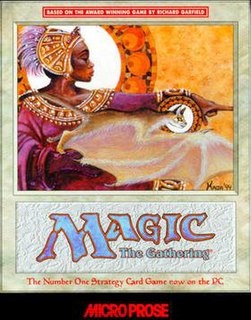
Magic: The Gathering is a video game published by MicroProse in April 1997 based on the collectible card game Magic: The Gathering. It is often referred to as Shandalar after the plane of Shandalar, where the game takes place. The player must travel the land and fight random enemies to gain cards, and defeat five wizards representing the five colors. The player must prevent one color from gaining too much power, and defeat the planeswalker Arzakon, who has a deck of all five colors. Adventure and role-playing elements are present, including inventory, gold, towns, dungeons, random battles, and character progression in the form of new abilities and a higher life point total. An oversized version of Aswan Jaguar was included in the game box.
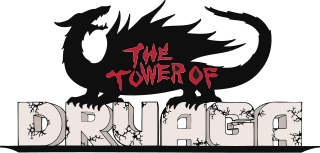
The Babylonian Castle Saga is a Japanese role-playing video game franchise developed and published by Bandai Namco Entertainment, formally Namco, for arcades and home video game platforms. Beginning in 1984 with the arcade title The Tower of Druaga, the series would spawn a total of nine sequel and spin-off games, alongside a manga, soundtrack albums, and two anime series by Gonzo K.K.. Later entries in the series would be developed by Endo's personal game company, Game Studio.
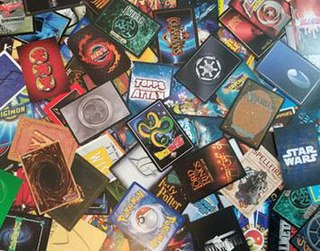
A collectible card game (CCG), also called a trading card game (TCG), among other names, is a type of card game that mixes strategic deck building elements with features of trading cards, introduced with Magic: The Gathering in 1993.
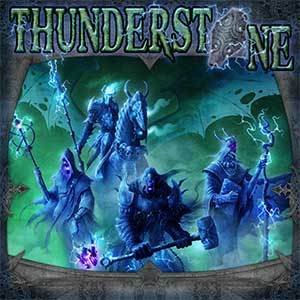
Thunderstone is a fantasy deck-building card game series designed by Mike Elliott, with artwork by Jason Engle. It was first published by Alderac Entertainment Group in 2009. Each card has dimensions of 6.3 cm x 8.8 cm. It has been translated into several languages.

Parallel Kingdom was a mobile location-based massively multiplayer game that placed a player in a virtual world on top of the real world, based on the player's GPS location. Parallel Kingdom was the first location-based RPG for the iOS and Android platforms. The game was developed by PerBlue, a privately held mobile and social gaming software company founded in 2008 and based in Madison, Wisconsin. In 2011, the game's user base surpassed 1,000,000 players worldwide. The game closed on November 1, 2016.
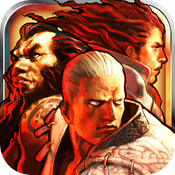
Kingdom Conquest is a massively multiplayer online game strategy game with incorporated city-building, card collection and third-person action gameplay elements, developed and published by Sega for iOS and Android devices in 2010. It is free to download and play, and offers several in-game purchases to enhance gameplay. A sequel, titled Kingdom Conquest II, was released in Japan in December 2012, and worldwide in January 2013.

Dungeon Village is a simulation video game developed and published by Kairosoft for the Android and iOS operating systems. It was released on March 2, 2012 for Android and iOS. The player is placed in control of a role-playing video game's town, and tasks the player with expanding the town and attracting heroes to live in it. It received mostly positive reviews from critics.
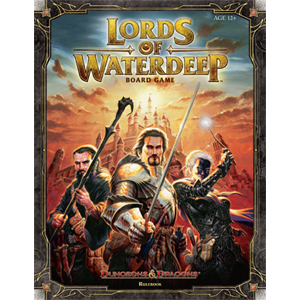
Lords of Waterdeep is a German-style board game designed by Peter Lee and Rodney Thompson and published by Wizards of the Coast in 2012. The game is set in Waterdeep, a fictional city in the Forgotten Realms campaign setting for the Dungeons & Dragons role-playing game. Players take the role of masked rulers of Waterdeep, deploying agents and hiring adventurers to complete quests and increase their influence over the city.

10000000 is a hybrid puzzle-role-playing game developed by Luca Redwood under the company name EightyEightGames, released initially for iOS devices in August 2012, and later for Microsoft Windows and OS X computers via Steam in January 2013, and to Android and Linux systems in March 2013.

Puzzle & Dragons is a puzzle video game with role-playing and strategy elements, developed and published by GungHo Online Entertainment for the iOS, Android, and Amazon Fire platforms.
Sword Girls was a Korean digital collectible card game developed by Zeonix (제오닉스) that was released in 2011. The game art was influenced by manga art style.

Yu-Gi-Oh! Duel Links is a free-to-play, digital collectible card game developed by Konami for the iOS, Android and Microsoft Windows platforms, based on Yu-Gi-Oh! Trading Card Game. After an initial beta period, the game was first released in Japan on November 17, 2016, and then released to the rest of the world on January 11, 2017. The Windows version was released worldwide via Steam on November 17, 2017.

Hearthstone is a digital collectible card game released by Blizzard Entertainment in 2014, available for Microsoft Windows and macOS PCs and iOS and Android smartphones. The game is free-to-play, with players gaining in-game currency and card packs via winning matches and completing quests, while real-world money can be spent to acquire additional card packs and cosmetic items. The game has been critically well-received and financially successful, estimated to earn nearly US$40 million per month as of August 2017. As of November 2018, Blizzard has reported more than 100 million Hearthstone players. Blizzard has continued to expand the game with the addition of multiple expansions, adventures and game modes.
A roguelike deck-building game is a hybrid genre of video games that combine the nature of deck-building card games with procedural-generated randomness from roguelike games.
















